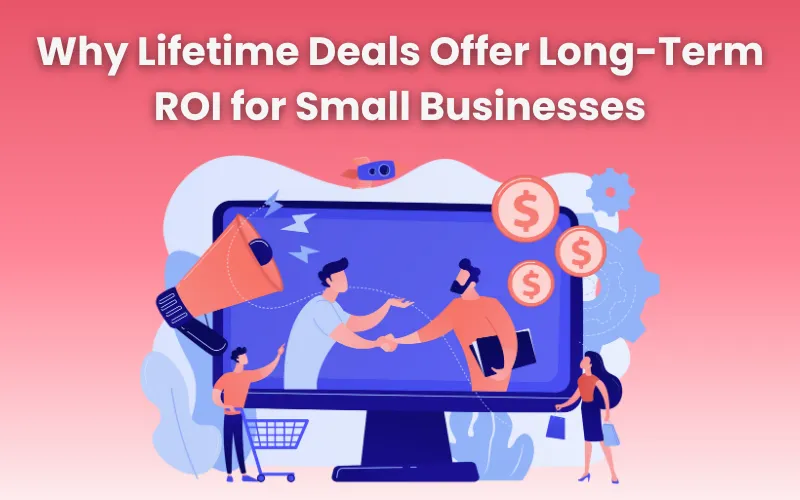Lifetime deals offer a one-time investment in digital tools, often at a fraction of their recurring price, and sometimes including cutting-edge AI tools. For small businesses, they present a practical path toward cost control and strategic growth. Instead of getting locked into monthly fees, you can pay once and continue using the product indefinitely. This stability and savings translate directly into long-term ROI for small businesses trying to do more with less.
What Is a Lifetime Deal?
A lifetime deal gives you permanent access to a product, usually software, for a single upfront payment. Startups or growing SaaS companies often offer these deals as a way to raise capital quickly or build a user base. You’re not just getting a discount. You’re buying the tool outright, avoiding subscriptions entirely.
This model differs from the standard pay-as-you-go structure. Instead of paying $20 every month for lead-building software, you might pay $49 one time. That pricing difference quickly adds up, especially if you plan to use the tool for more than a few months.
Immediate Cost Savings
A major reason lifetime deals are popular is the upfront savings. You eliminate recurring charges, which gives your budget more flexibility. Over a year, those savings stack up. For example:
- Email marketing tools that normally cost $240 per year may be available for $59 for a lifetime.
- A project management app billed at $12 per user monthly can cost $300+ annually for a small team.
Buying once and never paying again can help free up cash for hiring, marketing, or other tools. That kind of immediate return already shows the beginning of long-term ROI for small businesses.
Predictable Budgeting and Financial Planning
Knowing what your software will cost long-term is a major advantage. When you’re not dealing with fluctuating prices or unexpected renewals, you can focus more on strategic planning.

Lifetime deals give you price stability. Your tools are paid for. That makes forecasting expenses easier, which matters when you’re growing or working with limited funds. You can confidently build long-term projections without worrying about software costs rising. A wealth management consulting firm can guide small businesses to maximize long-term savings.
This predictability allows owners to think longer-term. It reduces stress around tool-related overhead and simplifies cash flow management. That clarity is part of what creates long-term ROI for small businesses.
Investing in Tools That Support Growth
Lifetime deals are more than just budget-friendly. They allow you to build a tech stack that grows with your business. When you invest in tools that streamline operations, reduce manual tasks, and support customer experience, you’re setting the foundation for efficiency.
Some tools are especially valuable when offered as lifetime deals. Customer relationship management (CRM) platforms are a great example. When you gain lifetime access to CRM software, you’re investing in lead tracking, segmentation, and automation without worrying about monthly fees. These tools work in the background to support your sales and marketing over the long term.
For instance, CRM can improve your marketing efforts by helping you personalize communication, monitor funnel stages, and streamline outreach. When you make a one-time payment for that kind of functionality, the value multiplies the longer you use it.
Small businesses benefit most from tools that integrate easily, reduce team workload, and add clarity to customer data. Choosing a strong CRM or operations tool with a lifetime license means that your one-time purchase keeps paying you back in productivity, customer retention, and streamlined workflows.
Best Practices for Choosing Lifetime Deals
When selecting tools, use the right software for your actual needs. Don’t buy just because something is 90% off. Ask:
- Will my team use this?
- Does it replace a tool we already pay monthly for?
- Does it integrate with what we already use?
Buying tools that solve real problems ensures that you’re making an investment, not a gamble. The most valuable lifetime deals improve your daily workflow and make your operations smoother.
Also, follow online deal communities or newsletters that specialize in reviewing SaaS lifetime offers. Look for comments from early adopters. These insights can help you understand the risks and the long-term potential before making a decision.
Risks and How to Avoid Them
Not every lifetime deal is a guaranteed win. Some tools never get updated, or don’t really support workflow. Others come from companies that shut down within a year. If the product goes unsupported, you’ve sunk money into software that won’t last.
To avoid this, vet the vendor before buying:
- Check their roadmap: Is development active? Are new features being added?
- Look at reviews: What are people saying in communities and forums?
- Evaluate the team: Are they responsive? Do they have a clear long-term vision?

You should also ask if updates are included in the lifetime plan. Some deals lock you out of future upgrades unless you pay again. If updates and support are essential, make sure they’re part of the offer.
Lifetime deals are best when they’re with companies that have traction and a clear product direction. When you choose wisely, you protect yourself while still getting the benefit of long-term use.
What’s The Gist of It?
Lifetime deals let you secure valuable tools for a fraction of their usual cost. For small businesses, they’re more than just budget-friendly—they’re strategic. You pay once and get permanent access to features that support sales, communication, and task management. That kind of stability reduces stress and gives you clarity around your future operations.
When chosen carefully, these deals can deliver long-term ROI for small businesses through savings, growth, and better customer management. Make smart investments in tools that solve problems, boost efficiency, and help you scale without adding to your monthly expenses.




